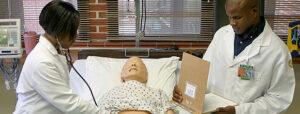
In an effort to stop the spread of the novel coronavirus, Florida A&M University created a Reopening Plan that required a large number of its courses to be moved to onlineand remote instruction. This includes courses that are offered by the School of Nursing.
The effects of COVID-19 are something our healthcare system will be challenged with for years to come and it all starts here, with our future nurses.
“So far, we are not really a fan of remote learning,” said Tyra Jackson, a fourth-year nursing student from Jacksonville. “However, we met the first three weeks of school to practice skills that we need to know when we go to clinical.”
Classroom and online learning can be useful when building a foundation for nursing. However, in order to master daily skills needed to take on this role — drawing blood, provided hands-on care and conducting physical examinations — nursing students must practice on real patients in real time.
Clinical is a core component for the education of future nurses. It is where students participate in supervised, hands-on learning sessions in a real-world environment. This gives students the opportunity to demonstrate all that they have learned inside of the classroom, or in this case, all that they have learned online.
An introduction paragraph found on the School of Nursing’s homepage addresses the transition in re-opening for this semester. The school is strongly encouraging students to communicate directly with their professors and academic advisers to ensure they have a successful semester.
Itcontinues to say: “For the health and safety of our students, faculty, staff and guests are important to us; there will be limited access to the Ware-Rhaney Building.”
Universities across the country have taken different stances on in-person clinical rotations despite nursing students across the country stating they are having difficulties adjusting to the new virtual learning environment.
In a normal world, when more than 260,000 people are not dying from COVID-19, nursing students would attend clinical settings every week.
In addition to weekly clinical rotations, nursing scholars typically spend long, daunting hours studying their material. “With classes being online, we have more free time than usual so it takes more discipline,” Jacksonsaid.
Because of the unyielding accreditation process, nursing professors and students must both come together despite the complications that this pandemic has brought forth.
The World Health Organization says that it will need six million nurses by 2030.